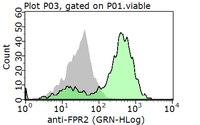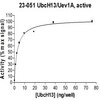ABF118 Sigma-AldrichAnti-FPR2 Antibody
Anti-FPR2 Antibody | ABF118 is an antibody against FPR2 Antibody for use in Western Blotting, Flow Cytometry.
More>> Anti-FPR2 Antibody | ABF118 is an antibody against FPR2 Antibody for use in Western Blotting, Flow Cytometry. Less<<Recommended Products
Overview
| Replacement Information |
|---|
Key Spec Table
| Species Reactivity | Key Applications | Host | Format | Antibody Type |
|---|---|---|---|---|
| H | WB, FC | Rb | Affinity Purified | Polyclonal Antibody |
| References |
|---|
| Product Information | |
|---|---|
| Format | Affinity Purified |
| Presentation | Purified rabbit polyclonal in buffer containing 0.1 M Tris-Glycine (pH 7.4), 150 mM NaCl with 0.05% sodium azide. |
| Quality Level | MQ100 |
| Physicochemical Information |
|---|
| Dimensions |
|---|
| Materials Information |
|---|
| Toxicological Information |
|---|
| Safety Information according to GHS |
|---|
| Safety Information |
|---|
| Storage and Shipping Information | |
|---|---|
| Storage Conditions | Stable for 1 year at 2-8°C from date of receipt. |
| Packaging Information | |
|---|---|
| Material Size | 100 µg |
| Transport Information |
|---|
| Supplemental Information |
|---|
| Specifications |
|---|
| Global Trade Item Number | |
|---|---|
| Catalogue Number | GTIN |
| ABF118 | 04055977123777 |
Documentation
Anti-FPR2 Antibody MSDS
| Title |
|---|
Anti-FPR2 Antibody Certificates of Analysis
| Title | Lot Number |
|---|---|
| Anti-FPR2 - 3276070 | 3276070 |
| Anti-FPR2 - 3861916 | 3861916 |
| Anti-FPR2 -Q2499606 | Q2499606 |
| Anti-FPR2 Polyclonal Antibody | 3136006 |















